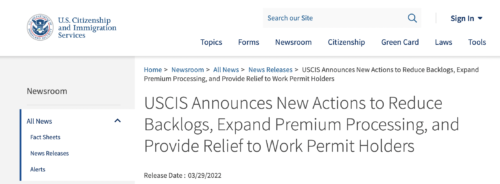
One of the frustrations we face as immigration lawyers is the time that United States Citizenship and Immigration Services (USCIS) can take processing documents and applications. On March 30, USCIS announced that it would expand premium processing to help speed the process. Applicants can pay for premium processing, which means that their paperwork moves up the queue and is dealt with more expeditiously, in some cases, as quickly as two weeks.
Putting an additional price tag on document processing makes the whole enterprise feel rigged in favor of applicants with means, but Stuart Anderson of Forbes views premium processing fees less suspiciously.
“It provides the agency with more revenue that can be used to address those issues and can help individuals and their employers overcome processing delays by paying an additional fee,” he writes.
The hope is that “The USCIS Stabilization Act,” the new fees charged, and the expanded authority to collect new premium processing fees will help ease the paperwork logjam the agency is dealing with.
The act will go into effect on May 31, 2022, and there are some specifics we know. USCIS plans to expand premium processing for I-539s (Application To Extend/Change Nonimmigrant Status), I-765s (Application for Employment Authorization) and certain categories of I-140s (Immigrant Petition for Alien Worker) as follows:
The Department of Homeland Security oversees this part of the process, and it is required to move cautiously so that this change doesn’t negatively affect the process for others. It does, however, plan to add additional categories for which premium processing will be possible.
USCIS is considering other ways to deal with logjam created by the previous administration, which slowed processing to create a 37 percent increase in the number of pending cases. It is working on the text for a possible new regulation that would prevent immigrant employees from losing their jobs due to processing backlogs.
If you want to know if premium processing is good for you, speak to an experienced immigration lawyer. We’d be happy to help. It’s not available in all circumstances, and based on our experiences, not all premium processing timeframes are that much faster than what we’re seeing with conventional processing. Still, you should always explore your options and see what suits your needs best.
Are you having legal issues with Immigration? Do you need legal representation?